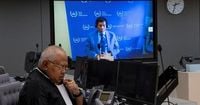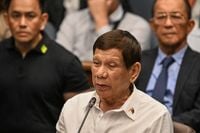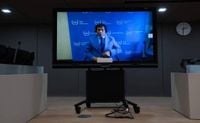On September 8, 2025, the International Criminal Court (ICC) in The Hague announced the postponement of a highly anticipated pretrial hearing for former Philippine President Rodrigo Duterte, citing concerns over his health and fitness to stand trial. The decision, which has ignited political debate and drawn mixed reactions from human rights advocates and Duterte’s supporters alike, marks a significant development in a case that has gripped both the Philippines and the international legal community.
Duterte, now 80 years old, faces charges of crimes against humanity for his role in the Philippines’ deadly anti-drug campaign, a policy that, according to various estimates, resulted in the deaths of thousands between November 1, 2011, and March 16, 2019. The ICC’s investigation covers not only his presidency but also his tenure as mayor of Davao City, where the crackdown is alleged to have begun. The case is the first of its kind involving a former Asian president charged by the ICC, underscoring its historic and contentious nature.
The pretrial hearing, originally scheduled for September 23, 2025, was set to determine whether there is sufficient evidence to proceed to a full trial on the charges of murder, torture, and rape—crimes that prosecutors allege formed part of a “widespread and systematic attack directed against the civilian population in the Philippines,” as reported by BBC and The Hague-based ICC. If the charges are confirmed, the case would move to the trial phase before a separate chamber.
However, in August, Duterte’s legal team filed a motion seeking an indefinite postponement of proceedings, arguing that the former president is “not fit to stand trial.” The specific nature of Duterte’s health concerns has not been made public, and the filings remain heavily redacted. Nevertheless, the court’s Pre-Trial Chamber I, with Judge María del Socorro Flores Liera dissenting, opted for a limited—not indefinite—postponement. The chamber stated that the delay was necessary “to allow sufficient time to adjudicate the request and related matters,” emphasizing its obligation under Article 67 of the Rome Statute to protect the rights of the accused.
“A limited postponement of the hearing on the confirmation of charges is warranted to allow sufficient time to adjudicate the Adjournment Request,” the ICC noted in its official statement on Monday, as cited by Inquirer and MindaNews. The chamber further clarified that the postponement “will be limited to the time strictly necessary to determine whether Mr. Duterte is fit to follow and participate in the pre-trial proceedings, including the confirmation of charges hearing.” A new date will be set once these issues are resolved.
Judge Flores Liera, in her dissenting opinion, expressed the belief that the defense’s request should have been rejected outright and that pretrial proceedings, including the confirmation hearing, should have continued as planned. This split within the chamber highlights the legal and procedural complexities at play.
Duterte’s first appearance before the ICC was on March 14, 2025, three days after his arrest in Manila and subsequent transfer to the ICC detention unit in the Netherlands. At that initial hearing, which he attended via videolink, observers noted that he appeared weak and spoke little. His lawyers, led by Nicholas Kaufman, requested interim release on humanitarian grounds, citing Duterte’s advanced age and health issues. However, both the ICC Office of the Prosecutor and the Office of Public Counsel for Victims opposed this request, arguing that such considerations did not outweigh the gravity of the charges.
The charges against Duterte stem from the so-called “war on drugs,” a campaign that, according to Philippine police, resulted in over 6,000 deaths. Human rights groups, however, claim the true toll could be as high as 30,000, a figure that has fueled outrage both domestically and abroad. Prosecutors allege that Duterte is individually responsible as an indirect co-perpetrator for crimes against humanity, including murder, committed during his terms as mayor and president.
The ICC’s involvement began in earnest after the Office of the Prosecutor applied for an arrest warrant on February 10, 2025, citing reasonable grounds to believe Duterte bore responsibility for these crimes. The warrant was issued under seal on March 7, 2025, and made public shortly thereafter. Duterte was arrested by Philippine authorities and surrendered to the ICC on March 12, 2025, in a move that has since become a flashpoint in Philippine politics.
Reactions to the postponement have been swift and polarized. Families of alleged victims have voiced disappointment and frustration, fearing that justice may be delayed or denied. “We expected that Duterte would do this, but the fact that he was able to convince the pretrial chamber to postpone that indefinitely is scary,” said Kristina Conti, a lawyer representing the families, in an interview with AFP as reported by BBC. Rights groups echoed these sentiments, viewing the postponement as a setback in their long campaign for accountability.
On the other hand, Duterte’s supporters have criticized the administration of current President Ferdinand Marcos Jr. for cooperating with the ICC and facilitating Duterte’s arrest and transfer. Many of these supporters dispute the ICC’s jurisdiction, arguing that Philippine authorities are capable of investigating the allegations independently—a position previously advanced by the Duterte administration in 2021 when it sought to suspend the ICC’s probe. However, appeals judges at the ICC ruled in 2023 that the investigation could proceed, rejecting the argument that the court lacked jurisdiction.
The case has exposed deep political divisions in the Philippines. Critics of Marcos Jr. accuse him of betraying national sovereignty, while supporters of the ICC process argue that international intervention is necessary to ensure justice for the victims. The debate has played out not only in legal filings and courtrooms but also in the court of public opinion, with both sides invoking issues of human rights, accountability, and the rule of law.
As the ICC deliberates on Duterte’s fitness to stand trial, the broader questions of justice and impunity remain unresolved. The court’s chief prosecutor, Karim Khan, described Duterte’s arrest in March as “a crucial step in our continuous work to ensure accountability for the victims of the most serious crimes under ICC jurisdiction.” Whether the proceedings will ultimately deliver a measure of justice for the thousands who lost their lives in the drug war—or whether legal and procedural hurdles will continue to delay resolution—remains to be seen.
For now, the world watches as the ICC weighs both the health of an aging former leader and the hopes of those seeking justice for a dark chapter in Philippine history.



